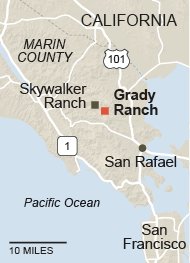Mr. Lucas said in an e-mail that he only wanted “to do something good for Marin,” waving away accusations of ulterior motives.

Credit
The New York Times
“I’ve been surprised to see some people characterize this as vindictive,” he said, adding that there was a “real need” for affordable housing here. “I wouldn’t waste my time or money just to try and upset the neighbors.”
Whatever Mr. Lucas’s intentions, his announcement has unsettled a county whose famously liberal politics often sits uncomfortably with the issue of low-cost housing and where battles have been fought over such construction before. His proposal has pitted neighbor against neighbor, who, after failed peacemaking efforts over local artisanal cheese and wine, traded accusations in the local newspaper.
The staunchest opponents of Lucasfilm’s expansion are now being accused of driving away the filmmaker and opening the door to a low-income housing development. That has created an atmosphere that one opponent, who asked not to be identified, saying she feared for her safety, described as “sheer terror” and likened to “Syria.”
Carl Fricke, a board member of the Lucas Valley Estates Homeowners Association, which represents houses nearest to the Lucas property, said: “We got letters saying, ‘You guys are going to get what you deserve. You’re going to bring drug dealers, all this crime and lowlife in here.’ ”
Mr. Lucas, 68, first bought land here about 30 years ago, after scouring the area for more than a year, said Catherine Munson, the real estate broker who sold him the land that became Skywalker Ranch. Over many hikes through the valley, Mr. Lucas explained his vision for setting up his movie production company here, Ms. Munson said.
“What he told us is exactly what he built at Skywalker Ranch,” she said. Lucasfilm said about 5,000 acres were permanently preserved with an 11-mile hiking trail. It later expanded its operations on adjoining land called Big Rock Ranch but eventually moved parts of its operations outside Marin County, opening facilities in San Francisco and Singapore. Still, the company pressed ahead with plans to build a 269,701-square-foot digital studio on a third ranch here called Grady. It submitted a so-called precise development plan for Grady in 2009, which the authorities had already endorsed as part of a master plan in 1996.
With the project seemingly winding its way toward approval, a group of residents in Lucas Valley resurrected a defunct homeowners’ association last summer. In November, the association and others sent a letter to Mr. Lucas requesting that he find a “far more appropriate location for the development.”
Credit
Patrick Fallon/Bloomberg News
The project, the letter said, would “pose a serious and alarming threat to the nature of our valley and our community,” “dwarf the average Costco warehouse” and generate light pollution so that “our dark starry skies would be destroyed.” The association hired an environmental consultant and a lawyer, then alerted the county to questions that state and federal authorities had raised about Lucasfilm’s plan to restore a creek. Last month, the county’s Board of Supervisors decided to postpone a final vote on the project.
Neal Osborne, a county planner, described the pending issues as minor and said that approval for Grady Ranch was nearing “the finish line.”
But a few days later, Lucasfilm pulled the project. Tom Forster, head of community relations at Lucasfilm, said the company feared that a possible lawsuit by the residents would delay construction indefinitely.
Not all of Lucasfilm’s neighbors were against the development.
Jeffrey Tanenbaum and Catherine Tripp, a couple who moved here from San Francisco last fall, became strong supporters, saying that Lucasfilm was just the kind of company Marin needed. Mr. Tanenbaum, a lawyer, challenged the legitimacy of the homeowners’ association, arguing that they did not follow bylaws in reorganizing last year.
“That’s why I refer to them as the de facto board,” he said.
After Mr. Tanenbaum sent board members an 18-point letter questioning their authority, some of them asked to come over for a chat one evening. After some red wine and cheese from neighboring Nicasio, Mr. Tanenbaum asked them to step down. (Board members said their association was legitimate, but said one member had resigned and a second one was preparing to do so.)
Supporters have asked Mr. Lucas to reconsider his decision. Instead, he has moved forward with his new idea, choosing a philanthropic group, the Marin Community Foundation, to develop affordable housing at Grady Ranch.
“George, being the great guy that he is, doesn’t want to build more housing for rich people since Marin is loaded with them,” Mr. Forster said.
Credit
Jim Wilson/The New York Times
Thomas Peters, president of the foundation, said that while some of the nation’s wealthiest people live here — Mr. Lucas is believed to be Marin’s richest resident — the county is also home to other people struggling to live in an inflated real estate market.
In a telling fact, a family of four with an annual income of $88,800 can qualify for housing assistance in Marin, which has about 6,500 income-restricted housing units, according to the county.
Supporters and opponents of Mr. Lucas have resigned themselves to having low-income housing next door.
“If the Grady Ranch had gone forward, it would have increased property value,” Mr. Tanenbaum said. “It’s likely that if affordable housing were to be built in the neighborhood, it would have a negative impact on property value. But that’s not a major factor for me. Affordable housing has to go somewhere.”
Tom Taylor, a member of the homeowners’ association board, said that responding to Mr. Lucas’s housing proposal was a delicate matter.
“I would say probably everybody has reservations about it, but nobody’s going to come out and say they don’t want it,” Mr. Taylor said.
“Everybody probably felt that he did it just for spite,” Mr. Taylor said. “But after thinking about it for a while, I guess I’d have to say that probably the site’s better suited for affordable housing than it was for the project he was intending to put there.”

